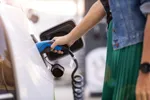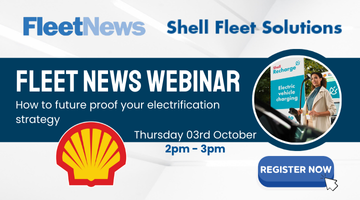By now we should all know about alternative fuels.
There is a finite amount of crude oil in the world – which is predicted to run out in 40 years’ time – and the petrol and diesel made from it pump out tonnes of CO2 and other gases that are slowly poisoning us and our planet.
This means we have to look at other, less harmful, means of moving goods.
Van manufacturers have not been slow to oblige.
We’ve had liquid petroleum gas (LPG), but fleets report mixed results on fuel savings.
Electric vans are being added to fleets every day, but are limited to about 100 miles per day.
On the horizon are hybrid electric/diesels and, of course, the hydrogen fuel-cell which will currently set you back about £1 million per vehicle.
But who would have thought until recently that natural gas would emerge as a front-runner in the battle to help clean up our planet?
Natural gas is such an also-ran in the alternative fuel market that you can’t even buy it at garage forecourts.
Our European cousins seem happy to accept this natural answer as a way of powering their vehicles but, in Britain, we’ve stolidly refused to have anything to do with it, despite the fact that most of our ovens and central heating systems run on it and we’ve been pumping it out of the North Sea for the past 25 years or so.
So what are the facts – and should we be looking to natural gas as a viable source of fleet fuel?
Let’s look at the benefits first.
Anyone who believes LPG is a ‘green’ fuel is mistaken.
Although it offers lower emissions than diesel, it’s refined from crude oil in the first place so in reality we are just passing the emissions from one place to another – that is, from where the exhaust gas is pumped out to where the LPG is manufactured.
The ‘well-to-wheel’ credentials of LPG are no better than that of diesel.
Natural gas, on the other hand, is completely natural. We can find it either sitting in vast caverns underground waiting for us to pump it out or we can make it from any old garbage we choose – literally.
Put a load of rubbish together and it starts producing methane, which can be used to power a van.
Natural gas is also cheaper than diesel and isn’t as likely to be subject to fluctuations in the price of crude oil.
However, the major downside of natural gas is that at the moment you can’t just go and buy it from your local refilling station.
That means unless you can return to base to refill from your own bunker, it’s not an option for mostfleets – a typical tank has a range of around 300 miles.
Another knock-on effect from this is that unless things change hugely, your expensive gas-powered van is likely to retain very little of its original value when you come to sell it.
After all, who’s going to buy a second-hand van that can’t be refuelled?
Despite these drawbacks, both Mecedes-Benz and Iveco have launched gas-powered models this summer.
Mercedes-Benz is launching the Sprinter NGT with a supercharged 1.8-litre petrol engine which will run on natural gas or bio-methane, pumping out 156bhp and 184lb-ft of torque.
Iveco’s new Daily features a 3.0-litre diesel engine with a revised head so that it can run on natural gas.
It produces 136bhp and 258lb-ft of torque.
As a precaution against being caught out with an empty tank away from base, the Daily will feature a small 15-litre ‘get you home’ tank of petrol.
So who exactly are these new models aimed at?
Steve Bridge, van sales and marketing director for Mercedes-Benz, believes there will be a healthy demand from fleets which can ‘bunker’ their own gas.
He said: “We looked at an LPG version, which would be capable of being refilled at garages, but we decided it was not an area that was worth investing in.
“We are working on the infrastructure problem at the moment but we believe this van will be of interest to councils who want to increase their green credentials and London-based fleets, as the NGT will escape the London congestion charge.
"We are also looking at sales to the 2012 Olympic games contractors.”
To combat the fuelling problem, Mercedes-Benz has decided to build such considerations into its sales package. Bridge said: “We’ll make offers to doubters of natural gas through our own contract hire arm and we’ll take the residual value risk.
"We will be competitive on price and we are predicting RVs on a par with Sprinter diesel models.”
Iveco is similarly upbeat about the prospects for gas.
In fact, Fiat started experimenting with natural gas as far back as 1937.
A CNG Daily was offered in the UK at the turn of the century, but there were problems due the amount of water in the gas that was available.
This clogged up the engines and the model was eventually withdrawn.
Now Iveco has teamed up with bio-methane producer Gasrec to ensure that the fuel meets its exacting standards.
Basically, if a fleet buyer is interested in taking on gas-powered Dailys, he or she will get a visit from not only Iveco but also from Gasrec.
Dealers won’t be offering this model in the showrooms owing to its complexity.
The price will be £7,000 more than a conventional Daily, although Martin Flach, Iveco’s product director, told Fleet Van he reckoned savings of £3,000 per year per van were achievable, both through lower fuel costs and the fact that it will be exempt under the London congestion charge.
Tests have shown a 30% fuel saving and 62% reduction in CO2 emissions over a standard Daily.
Flach said: “We’re not talking about sales to fleets that thrash up and down the motorways all day.
"We will sell this van to councils and utilities and fleets that can get back to base to refill.”
Case study: Camden Council
Camden Council has been successfully running a CNG-powered Iveco Daily for the past six months.
The vehicle, a 65C14G cage tipper, is being used for recycling and street cleaning operations, and operated entirely on bio-methane provided by Gasrec.
The vehicle travelled 4,372 miles and consumed fuel at 54.24lb every 62 miles.
A similar diesel vehicle achieved 6.9 gallons per 62 miles.
This equates to a fuel saving of 30% while CO2 emissions dropped from 7,295kg in a diesel model to 2,771kg.
Iveco product director Martin Flach said: “The market for gas vehicles on the continent is many times that of the UK, but this is mainly due in this country to the poor infrastructure and quality of gas from the mains, which has a high moisture content.
"Following the success of this trial, we are in discussion with several key operators to evaluate the potential of this gas-powered Daily.”


















Login to comment
Comments
No comments have been made yet.